Whatever happened to the great British campaign to stop rape in war?
The UK once stood at the forefront of ending sexual violence as a weapon of war but its voice has rather disappeared from view, writes Mary Dejevsky. So what happened?

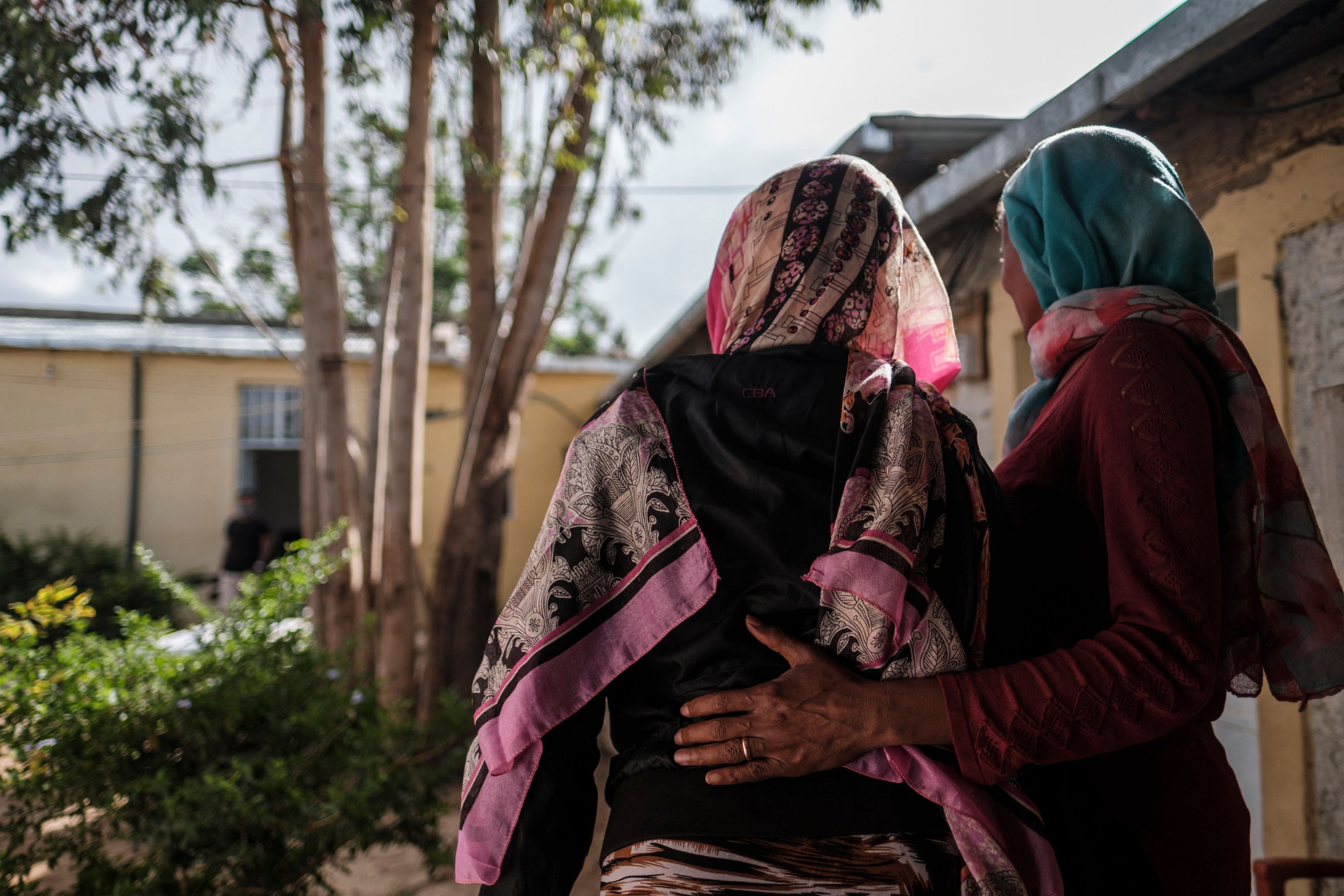
The plight of the Uighur people in China’s northwestern region of Xinjiang has been in the sights of western reporters for many months now, with re-education camps, slave labour and forced sterilisation among the charges. Secretly shot footage showed hundreds of young men, blindfolded and shackled, apparently being transferred from a train; more than a million people are said to be in detention.
A few weeks ago, it emerged that Beijing’s repression of the mainly-Muslim Uighurs did not stop there. A BBC investigation included interviews with several Uighur women who testified that sexual violence, including rape and gang-rape, was among the weapons the Chinese authorities were deploying in the region.
One of the women, Tursunay Ziawudun, now in exile in the United States, spoke of women being taken out of their cells every night to be raped by one or more Chinese men in masks. She said she herself had been gang-raped three times during a nine-month stretch of detention in 2018. A woman from the Kazakh ethnic minority said she had been forced to strip Uighur women and tie their hands before leaving them to their fate. The woman, Gulzira Auelkhan, said the Chinese men would bid for the “prettiest young inmates”.
China has dismissed all the allegations, insisting that it follows “international guidelines” on human rights everywhere in the country, including Xinjiang. But its denials have cut little ice with western governments. The BBC report prompted a petition and a British parliamentary and is thought to have contributed to the government’s decision last month to impose sanctions on China for “gross human rights violations against Uighurs and other minorities in Xinjiang”.
Read More:
The sanctions – part of a coordinated international move – brought almost immediate counter-sanctions from China, and the BBC’s Beijing correspondent, John Sudworth, made a hasty exit from the country and relocated to Taiwan, complaining of “massive surveillance, obstruction and intimidation” from the Chinese authorities.
China’s Uighur women have claimed the most shocking headlines in recent months, but they are hardly a unique case in being subject to organised sexual violence. Since the reports about Xinjiang, there have been reports of rape being used as a weapon in the current conflict in Tigray, Ethiopia. Last month, the UN deputy humanitarian coordinator for Ethiopia, Wafaa Saeed, said there was was evidence of “targeted killings, sexual and gender-based violence, and forced displacement of people”. She said that five medical facilities in Tigray had recorded 516 rape cases in mid-March, with women saying they had been raped or gang-raped by armed men. There were even reports of men forced to rape members of their own family, while others were forced to watch. Doctors treating Tigrayan refugees in Sudan confirmed the prevalence of rape, and its use, in their view, as a weapon of war.
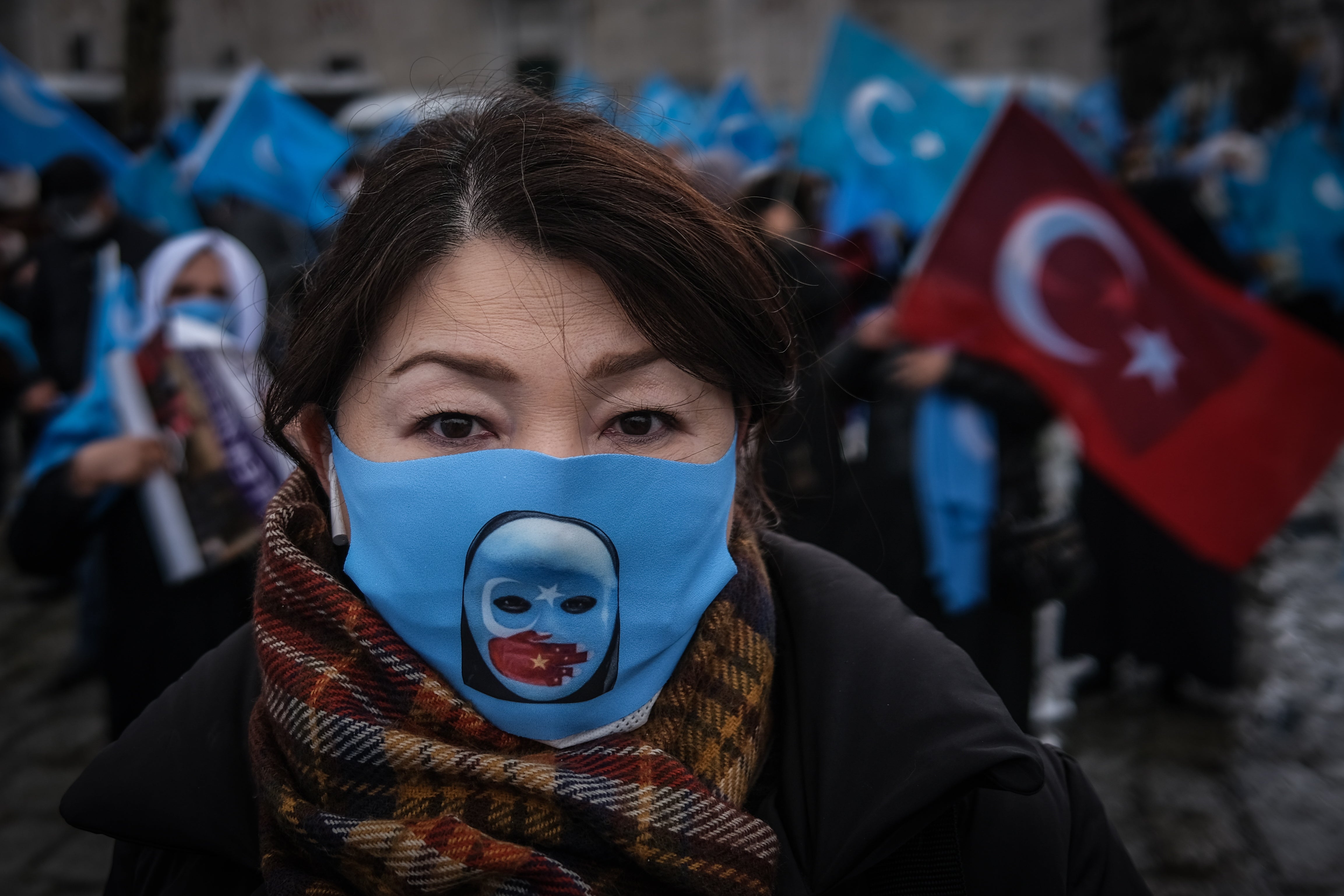
And before Xinjiang and Tigray there were the violent expulsions of Burma’s mainly Muslim Rohingya minority, where reports of sexual violence and rape again proliferated. In August 2018, the UN Independent International Fact-Finding Mission on Myanmar accused the Burmese military of committing genocide and war crimes in Rakhine State, with methods including rape, sexual slavery, abductions and much more.
It documented specific atrocities, including in the village of Min Gyi, and reported gang-rape as almost routine, saying “victims were severely injured before and during rape … They suffered serious injuries to reproductive organs, including from rape with knives and sticks. Many victims were killed or died from injuries. Survivors displayed signs of deep trauma and face immense stigma in their community.”
And before the Rohingya in Burma there were the women from Iraq’s Yazidi minority, thousands of whom were raped and enslaved by Isis fighters after their enclave in the northern Sinjar district was overrun. Many were transported to Isis headquarters in Raqqa, Syria, comprehensive accounts of their torment only reaching the outside world after the fall of the city to US-backed Syrian opposition forces three years later in 2017.
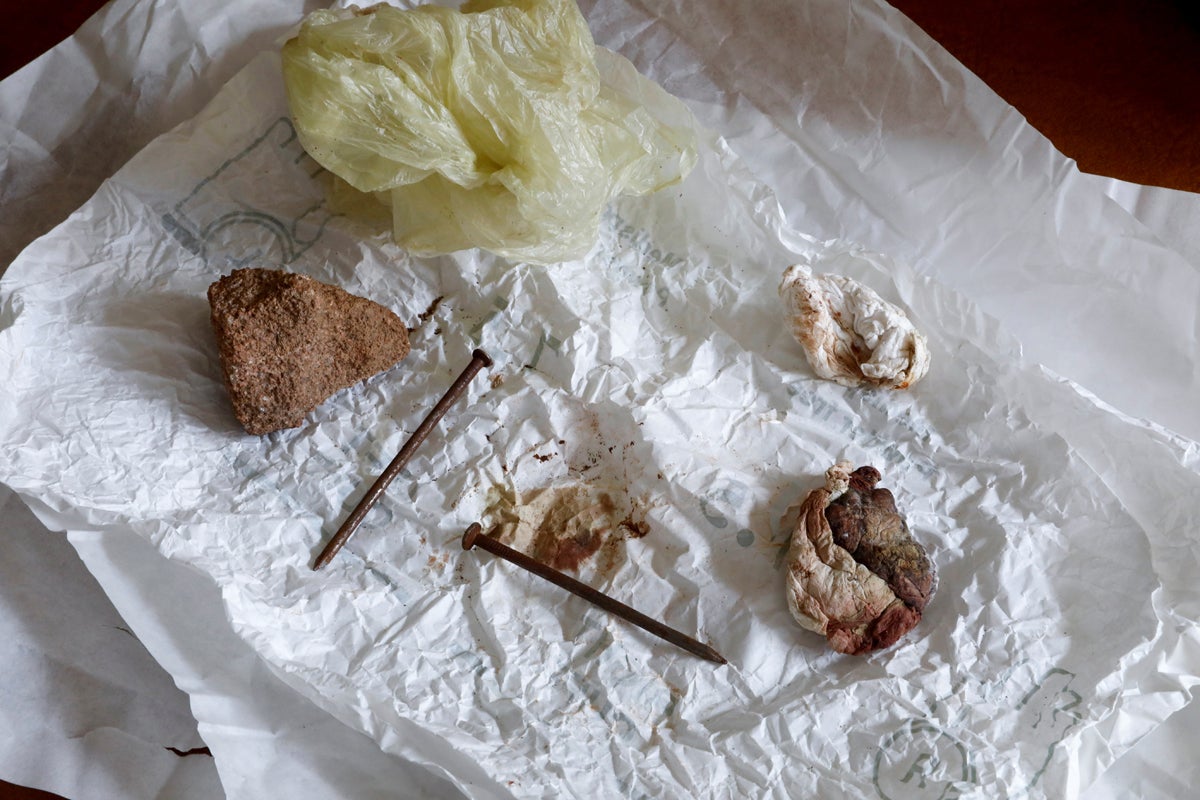
And before that there was Bosnia, during the 1992-3 civil war that followed the collapse of Yugoslavia, where the International Criminal Tribunal for the former Yugoslavia (ICTY) judged that “systematic rape and sexual enslavement”, specifically in the part of Bosnia known as Republika Srpska, should be classified as a “crime against humanity”. Estimates of the numbers of women raped –mainly, but not exclusively, Bosnian Muslims attacked by Bosnian Serb men – vary from 12,000 to 50,000, with reports in the immediate aftermath and corroborated in subsequent inquiries and trials speaking of “rape hotels” operating inside detention camps.
The war in what is now Bosnia-Herzegovina, in fact, marks a grim milestone of a kind, in that it was in the aftermath of this conflict that mass rape, along with slavery and sexual violence, were recognised internationally for the first time as crimes against humanity and prosecuted by an international tribunal.
Although there were some successful convictions – with sentences of more than 40 years in two cases – prosecutions have been few and far between, with just 44 men indicted by the ICTY for crimes related to sexual violence in that war. In 2017, 25 years on, Amnesty International found that more than 20,000 victims were still trying to get support and legal redress.
At which point, perhaps, it is worth stopping for a minute and trying to remember something. Yes, the British government has imposed sanctions on China over the violations in Xinjiang, as part of a concerted international move. Yes, it has called for an end to the violence in Tigray and access for aid providers. In 2016 a unanimous House of Commons vote declared that the way Isis was treating the Yazidi and Christians in Iraq amounted to genocide and called for the matter to be referred to the UN Security Council. The vote was, incidentally, against Foreign Office advice that any legal definition of what had happened needed to be left to the courts.
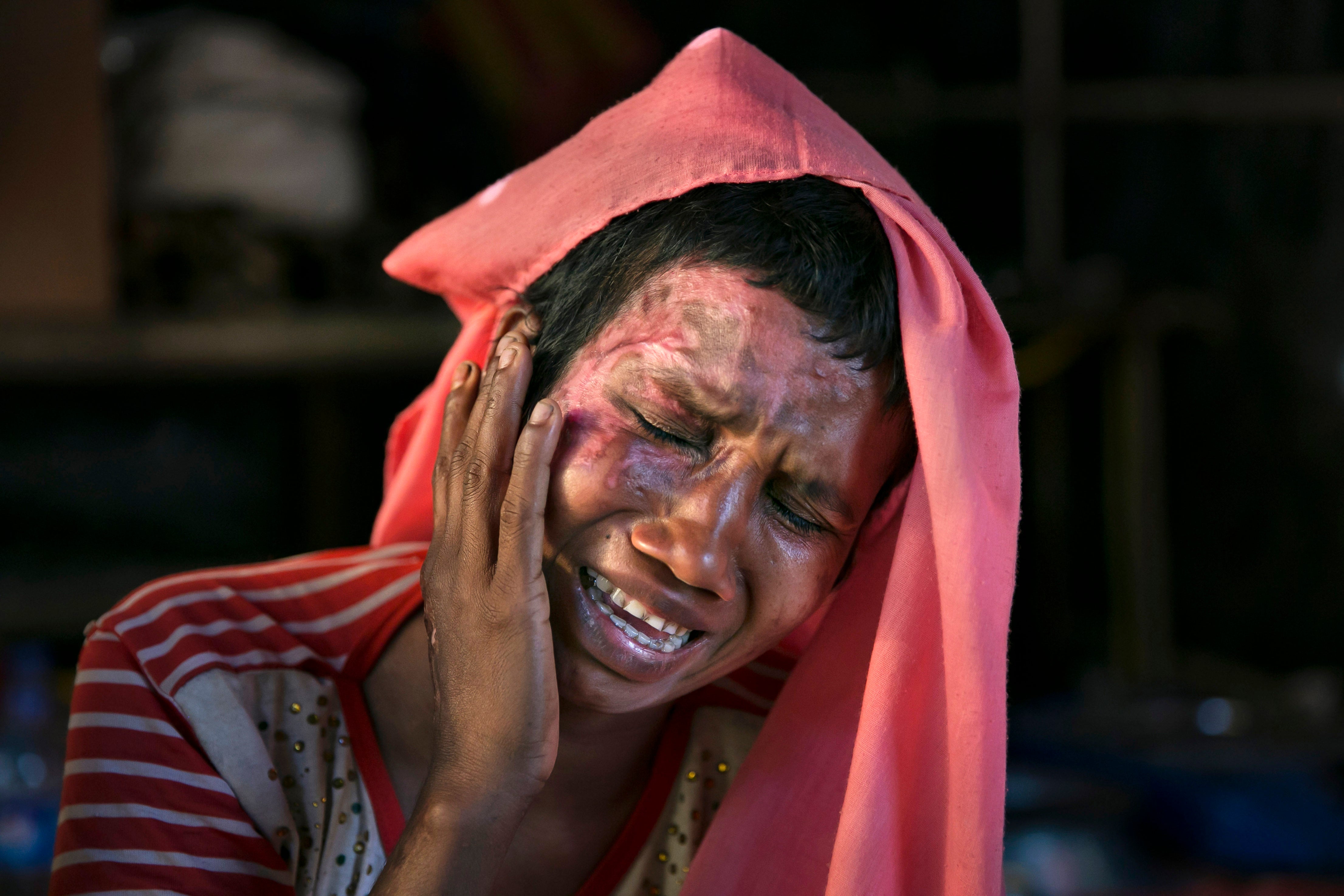
So there has been plenty of vocal condemnation from the UK’s powers that be. But there was a time, not so long ago, when the UK’s ambitions were rather greater – indeed, when an actual foreign secretary initiated and then led a high-profile international campaign designed not just to address, but to prevent, the use of rape and sexual violence in war.
You may even have a picture in your mind’s eye – the same picture that I do – of the then foreign secretary, William – now Lord – Hague, appearing alongside the Hollywood star and director Angelina Jolie, then special envoy of the UN High Commissioner for Refugees, as co-founder of the UK’s Preventing Sexual Violence Initiative. This was in May 2012, when they launched the campaign with great fanfare at the Foreign Office and regaled guests with a screening of Jolie’s film In the Land of Blood and Honey, about an inter-ethnic love affair during the Bosnian war, in which sexual violence is a prominent theme and the failure of other countries to act is deplored.
In his speech to the gathering, Hague said he had become engaged in the issue after hearing first-hand accounts from victims of sexual violence in Darfur and survivors of the Srebrenica massacre, and now there were fresh reports starting to come in from Syria. He said he had been shocked to learn that so far only around 30 people had been convicted for the up to 50,000 rapes committed during the war in Bosnia.
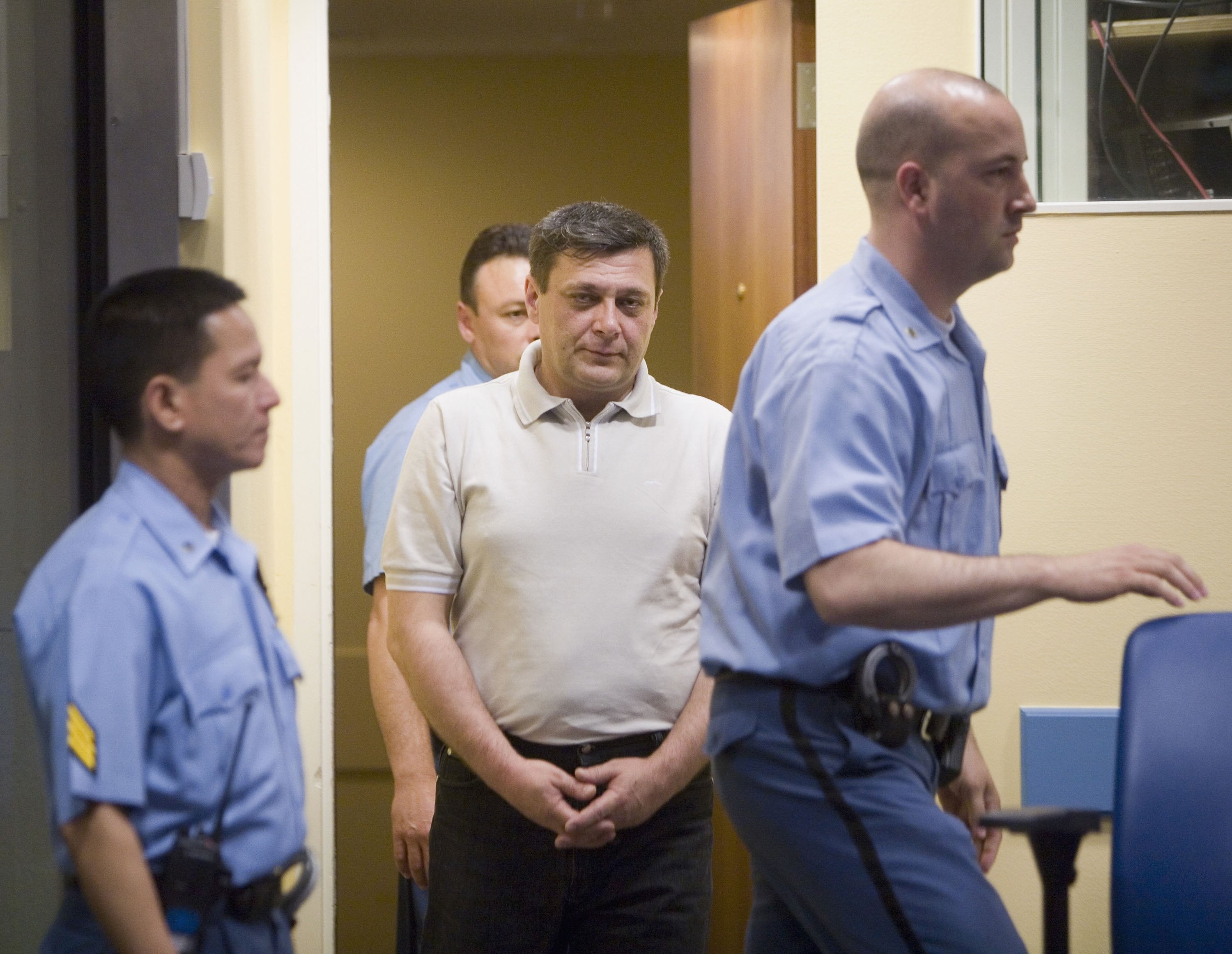
He said that increasing the number of successful prosecutions was a priority, as was support for victims to speak out and claim their rights. He said: “We want to use Britain’s influence and diplomatic network to rally sustained international action and to push this issue up the global agenda”, and he said it would be a flagship issue for the UK’s G8 presidency the following year. Among practical measures, he promised a new UK team of experts, including doctors and lawyers, that could be deployed at short notice to gather evidence and testimony that could be used in investigations and prosecutions.
So far, so good. In March 2013, Hague and Jolie headed a joint mission to the Democratic Republic of Congo and Rwanda, where they met rape survivors and promoted their initiative. A year later they made what was an ostensibly successful visit to Bosnia. And that June, the Foreign Office convened a huge international summit on the subject at London’s Excel Centre – which perhaps offered a harbinger of where things might go wrong.
More than 100 countries were represented, with one participant – a Durham University academic and former volunteer chair of the Rape Crisis (England and Wales) charity – describing it as “certainly more glamorous than any sexual violence event I have ever attended”. A promotional press release said: “We want people, governments, faith leaders and civil society across the world to condemn the horrors of warzone sexual violence, to see the cycles of conflict it creates and to grasp the role they have to play in ending this crime once and for all.”
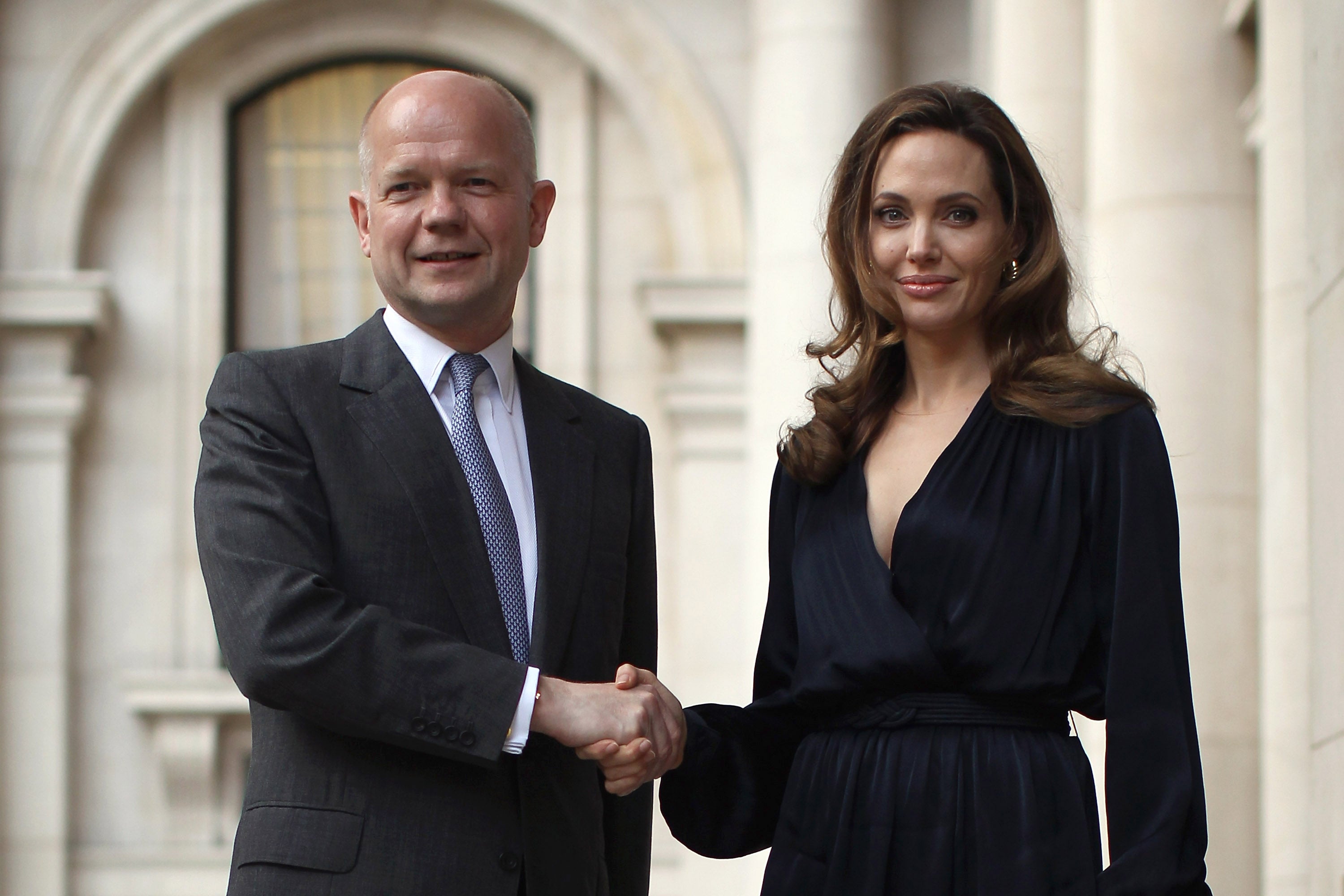
That “once and for all” was always going to be quite a stretch, and the conference was marred when a group of rape survivors and campaigners from the Democratic Republic of Congo complained that they had been refused entry, an error blamed by the organisers on the private security firm; you guessed it, G4S. The reason, however, might have been more complicated. The group had been hoping to distribute cards blaming sexual violence in the DRC – dubbed by some “the rape capital of the world” – on a conflict about mineral wealth in which UK companies were implicated. The incidence of sexual violence, they said, was a product of the war and would not end until the war did. Others pointed out that the conference had cost the UK government five times more than it had earmarked to spend on the actual sexual violence initiative in 2015.
Now here I should put some cards on the table. I was never a great enthusiast for the Hague-Jolie initiative, for two reasons. Experience suggests that the real effect of a campaign can be in inverse proportion to the glitz of its launch. I also tended to the simplistic view that rape, along with pillage, had been the hallmark of marauding armies pretty much since the beginning of time, and that any initiative designed to curb it, let alone prevent it, was doomed to fail. What made the then foreign secretary, even with a Hollywood superstar by his side, think he could make any impression on such an ingrained fact of life?
On the second point – though not the first – I have changed my mind, thanks to the arguments of campaigners such as the emeritus LSE law professor, Christine Chinkin. Rape and war do indeed go together, but there is a difference between sex-starved troops out of control – an age-old phenomenon, where training and discipline can make an impact – and sexual violence as an actual weapon of war, which is what the Hague-Jolie campaign was all about. This is where a state or an armed force may encourage, even order, its soldiers to use sexual violence as a method of ethnic cleansing – to deter women, say, from returning to their home territory, or to undermine the future of their particular ethnic or religious group by blighting their prospects of marriage and child-bearing.
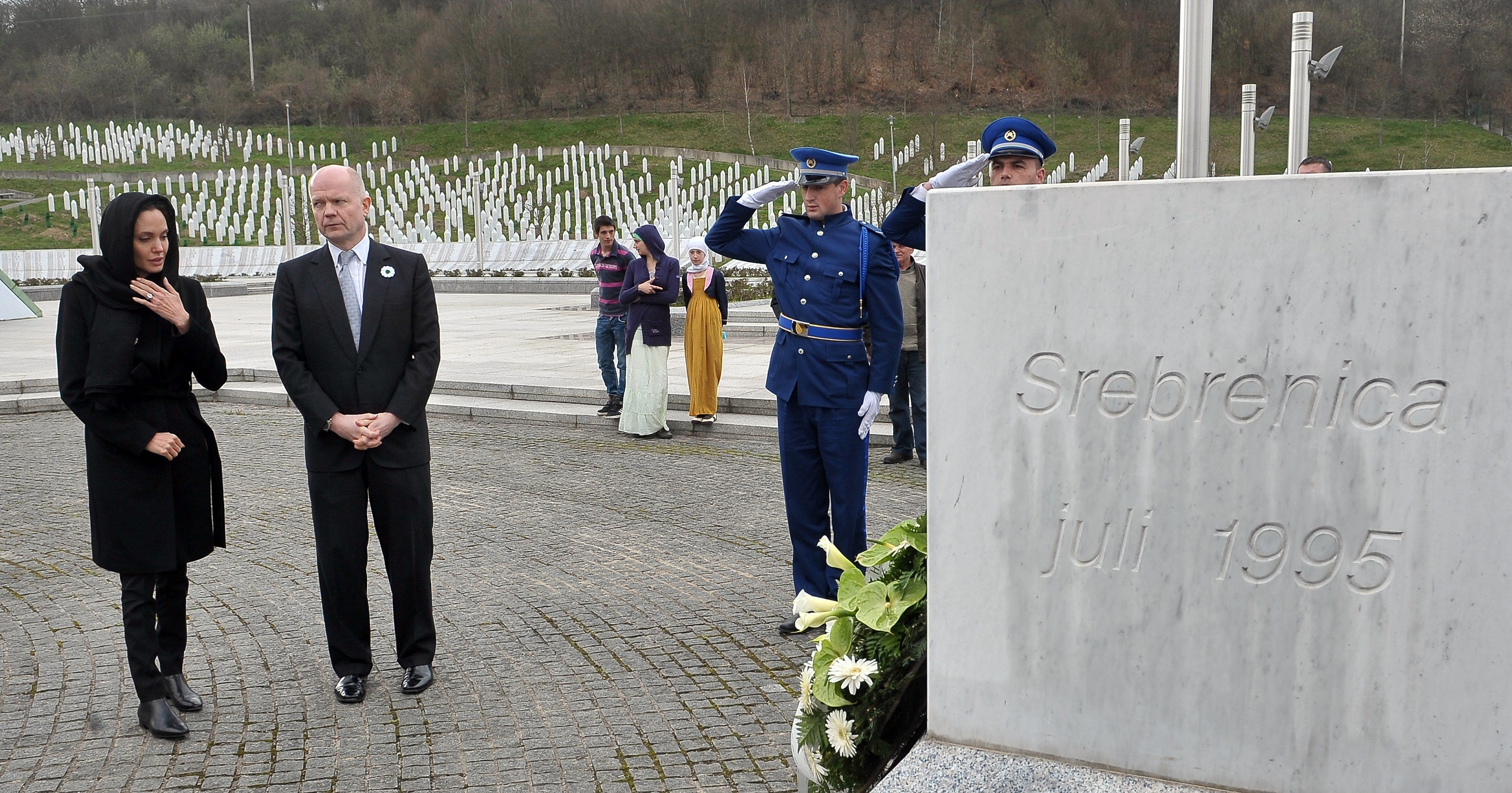
That it is now accepted that sexual violence can be used as a weapon of war and, as such, constitutes a crime to be prosecuted in international tribunals, however, does not make campaigning against it particularly easy. Not only are sexual crimes difficult to prosecute in any jurisdiction – think of the low rape convictions in the UK – but internationally the picture can be complicated where countries, such as the UK, have commercial or other interests that conflict with the pursuit of those responsible. This difficulty, though, is only a part, and a small part, of why the British government’s high profile initiative against sexual violence in conflict began to languish and, by now, has almost faced away.
A much bigger part turns on people and the way power works in the UK. When William Hague left the Foreign Office, soon after the London conference, the campaign lost its chief advocate in the cabinet. And while the seat he took in the House of Lords a year later would have given him a political and public platform to use for that purpose, had he so chosen, he had no direct say any more in the funding, which was approved on a year-to-year basis. With many competing claims on the government’s purse, the money dwindled.
Nor was Hague himself the initial, or even the main, driving force behind the campaign. The inspiration was rather his special adviser, Arminka – now Baroness – Helic. Helic has the perfect “good refugee” backstory. A Bosnian Muslim, she arrived in the UK in 1992 as a fugitive from the Serbs’ ruthless campaign of ethnic cleansing. Then 24, she took menial jobs and worked her way to a master’s degree in international history at the London School of Economics.
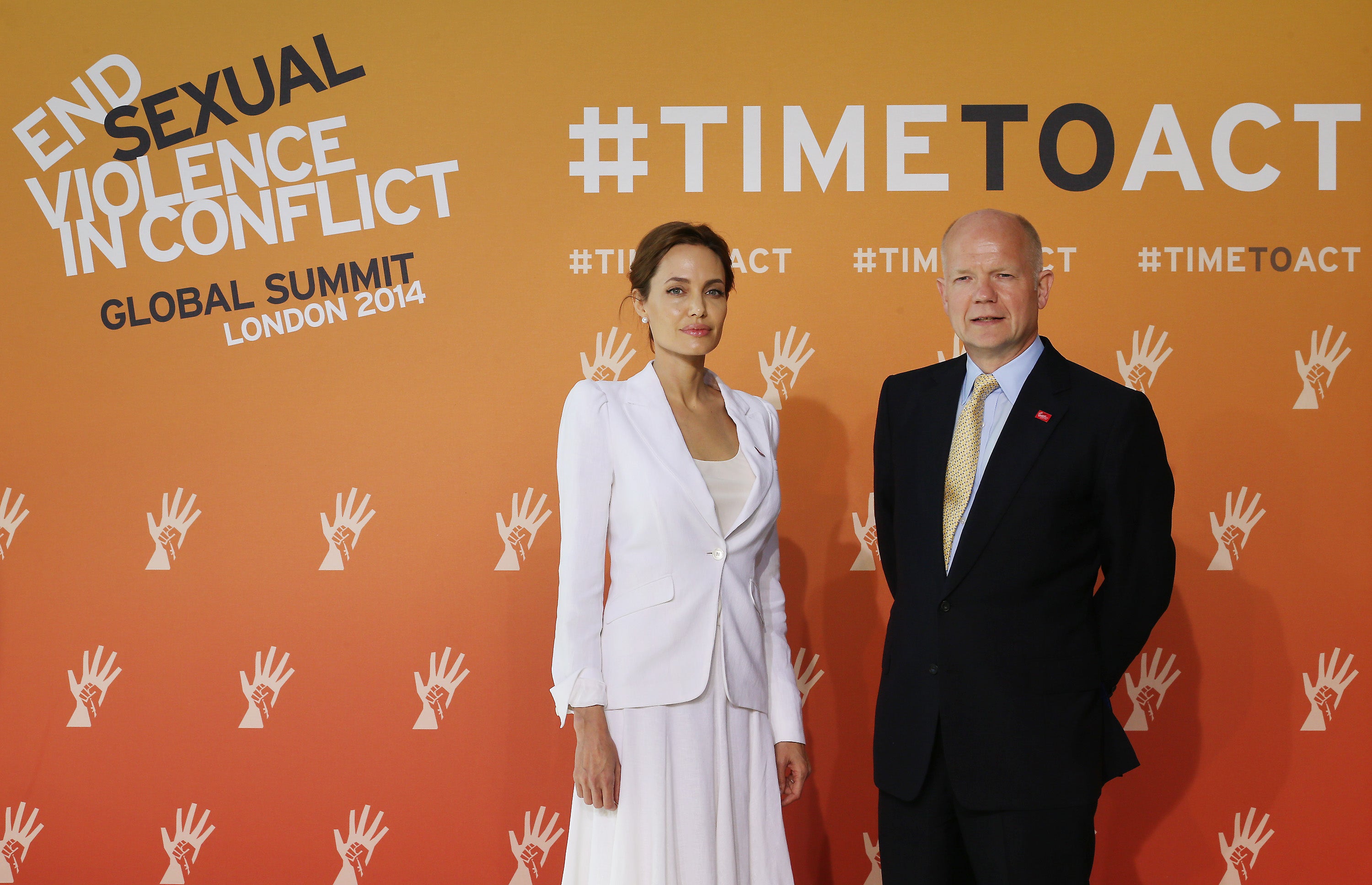
She soon had a job filing press cuttings in the House of Commons library and started giving advice to UK officials on policy towards the former Yugoslavia. She was a special adviser to Hague when in was in opposition and throughout his time as foreign secretary from 2010. From my own observation, she is hard-working, ultra-smart – in the American sense – driven in the causes she supports, an accomplished behind-the-scenes networker, and highly persuasive.
Helic is also the key to the Hague-Jolie double-act of 2012, having approached Jolie after seeing her film and subsequently become her adviser and friend. But when Hague left the Foreign Office, his crucial top-table advocacy was lost. Not only that, but there was no continuity – there have been four foreign secretaries in the past five years. Plus, Helic said recently that the extent to which the sexual violence initiative was associated personally with Hague turned out to be a liability. None of his successors was particularly keen to take up someone else’s cause; they wanted to make a mark of their own.
Helic herself is now a board member of the Trust Fund for Victims of the International Criminal Court, and she sits on the Foreign Office Advisory Board for the Preventing Sexual Violence in Conflict Initiative, but she is not as close to the centre of power as she once was.
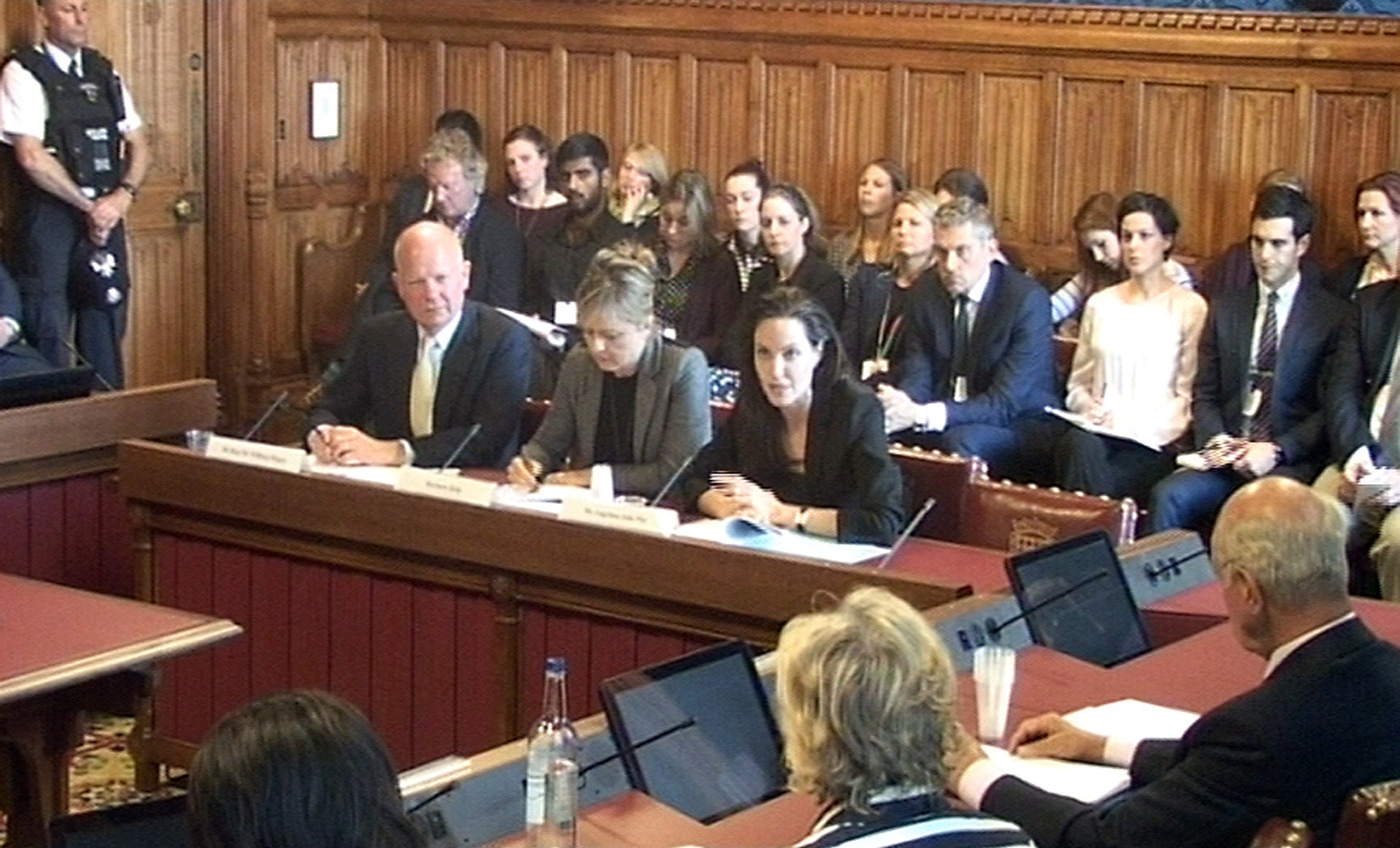
Even the dispersal of the trio that pioneered the initiative, however, is not the whole reason as to why it faded. A damning review by the aid watchdog, the Independent Commission for Aid Impact, published at the start of last year found that, as well as personnel issues, there was “no overarching strategy, and the work was dissipated across three government departments”. But the clinching argument was probably this: “Delays in funding and unrealistic project timelines risk doing more harm than good to survivors.” So not only had the initiative largely failed in its central objective, it could actually have harmed those it had been created to help.
And the awkward truth is that the whole concept had started to run into some serious opposition. One strand of this reflected popular scepticism of the sort I had felt at the start of the Hague-Jolie campaign, but mainly it came from those best informed on the issues, who were working in academic or, more often, out in the field. Around the same time the critical report appeared from the aid watchdog, so did a flurry of academic articles and reports contesting the whole rationale for the project.
Last September, in an unusual departure, International Affairs, the journal of the London-based thinktank Chatham House, devoted a special section to the question of sexual violence in conflict. It was unusual also because the thrust of the articles ran contrary to what had seemed an established consensus.
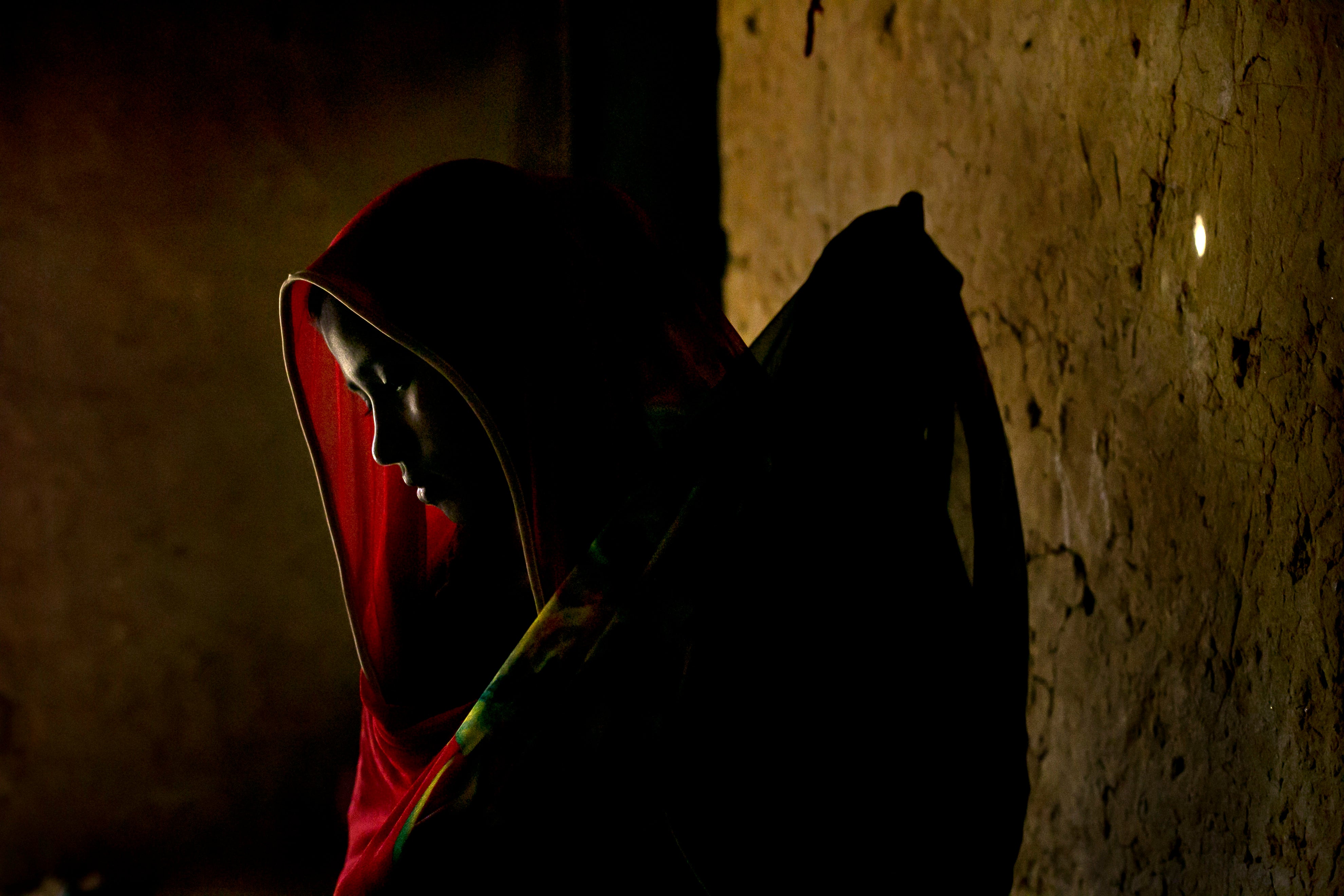
Among the arguments advanced – and I am necessarily simplifying – was that initiatives taken so far, and the international judicial framework, treated the problem as exclusively male against female violence, although this ignored a real problem of sexual violence against men and boys. It was also argued that they perpetuated the stereotype of women as victims, and of male on female violence of a sexual nature necessarily being sexually motivated.
To my mind, one of the most compelling arguments was that encouraging women to speak out and identify and testify against those who had violated them risked exposing them not only to additional danger, but to stigma that could blight their future in their own communities. Unless there was support for women throughout this process and they were offered an acceptable alternative future, the consequences for them could be even worse and longer-lasting than their experience in war.
Read More:
What has happened is that the multiple defects in the way the initiative was conceived and implemented, on the one hand, and, on the other, the direction in which theoretical and practical approaches to the whole issue of sexual violence in war are now moving, have combined to eclipse the effort that William Hague and Angelina Jolie set in train to so much fanfare. What was once the highest-profile, most fashionable cause in town and a way for the UK to put itself on the international map is now just one cause among many.
In last month’s Integrated Review – essentially the government’s blueprint for the UK’s post-Brexit foreign policy – the attention given to the issue was perfunctory to say the least, and seemed to adopt a slightly chastened tone.
“The UK,” it said, would work “to alleviate suffering and … build momentum on efforts to prevent sexual violence in conflict. In particular, we will work with others to strengthen justice for survivors of conflict-related sexual violence, as well as providing support to survivors and children born of conflict-related sexual violence. In doing so, we will continue to follow the ‘do no harm’ principle and take a survivor-centred approach.”
Whether this means that lessons will really be drawn from an initiative that, nearly 10 years on, has bequeathed more in the way of headlines than help, and may even have left some women more damaged than they already were, is another matter.
Join our commenting forum
Join thought-provoking conversations, follow other Independent readers and see their replies
Comments
Bookmark popover
Removed from bookmarks